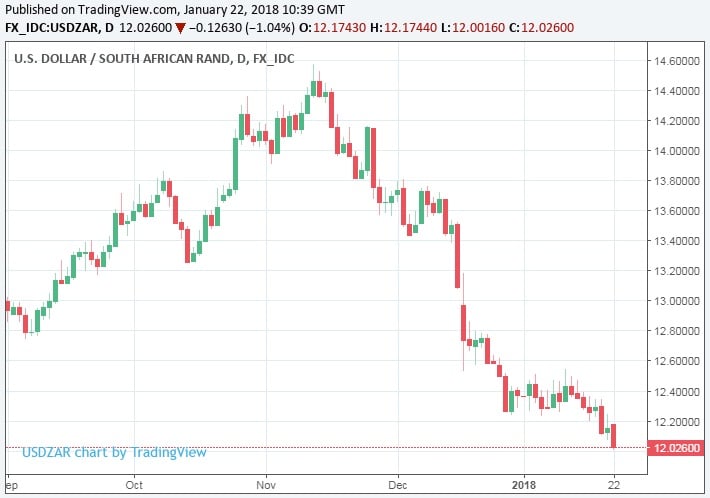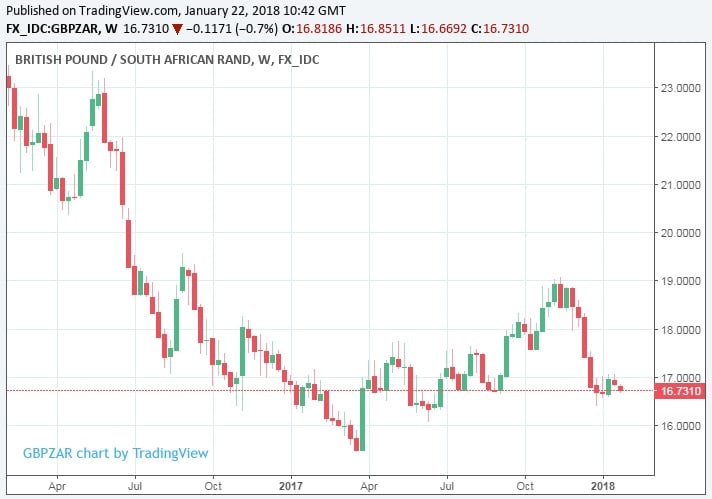South African Rand the Comeback Kid for 2018 As Markets Bet on Ramaphosa’s Reforms
- Written by: James Skinner

Efforts to oust President Zuma are gaining momentum and fuelling a rally in the Rand. When the dust settles on politics, the SARB will take centre stage again.
South Africa could be on the verge of becoming the emerging market story of 2018, according to one strategist, if Cyril Ramaphosa is able to elbow Jacob Zuma from the state presidency.
Already the Rand has gained some 3% on the US Dollar in January as the greenback weakens and international investors flood into South African stocks.
The President’s removal would be seen clearing the way for the ANC’s new leader to make progress in rooting out corruption and reforming the state and its enterprises.
“Domestic political developments will spur yet further optimism towards the rand,” says John Cairns, a currency economist at Rand Merchant Bank (RMB).
"Weekend reports suggest that the ANC NEC has agreed that Ramaphosa should take over The Presidency - although no time has yet been agreed - while a new board has been installed at Eskom."
Earlier in January South Africa’s parliament began working to formalise the process of removing a sitting president, which prompted hopes the scandal-plagued Jacob Zuma could soon be removed from office. Recent speculation suggests he could be gone within a month.
Meanwhile, Cyril Ramaphosa has hit the ground running in his ANC party presidency by replacing the board of state power utility Eskom. Eskom, which is beset by cash-flow problems, is a critical issue for the South African state and Ramaphosa.
The South African Treasury is on the hook for as much as ZAR 350 billion (£21 billion) of Eskom’s debt, given government guarantees extended to the energy company in recent years, which means Eskom is also an issue for the ratings agencies.
“Large reforms at SOEs have helped to revitalize the recent rally in both the rand and bonds,” says Gordon Kerr, an interest rates strategist at RMB.
"In addition, local political power seems to be slowly leaning towards the reformist camp, which gives investors hope that a potential downgrade by Moody’s in March might be avoided."

Above: USD/ZAR shown at daily intervals.
Advertisement
Get up to 5% more foreign exchange by using a specialist provider to get closer to the real market rate and avoid the gaping spreads charged by your bank when providing currency. Learn more here.
Credit Rating is Key to the ZAR Rally
Moody’s is the last ratings agency to have South Africa’s local currency bonds rated as investment grade, although this rating is under review and could be withdrawn as soon as February or March.
With Ramaphosa having won the ANC leadership election in December, South Africa has overcome the first hurdle to preventing a downgrade, by offering markets some hope of reform. But a February 21 budget statement that sets out a credible plan for reducing a still-rising budget deficit will be key to determining whether the country is able to keep its investment grade rating.
“The ANC's National Executive Committee has asked Zuma to resign – admittedly without giving a deadline for now,” says Ulrich Leuchtmann, head of G10 FX strategy at Commerzbank.
"Even if things aren't going as fast as some observers suspect, it is still to be hoped that such a troubled president will no longer be able to push through such an extreme budget that even the last rating agency would have to lower South Africa’s credit rating to junk status."
Should South Africa suffer a downgrade, many institutional investors could be forced into selling their South African bonds, which would push government borrowing costs higher and put downward pressure on the Rand as foreign investors flee the country.
If South Africa is succesful in averting a downgrade it would be enough to extend the January rally in South African assets, including stocks and South African government bonds. Improved sentiment toward South African assets and the economy might even provide the country with a growth dividend.
“Expect further optimism as the SA contingent at Davos talks the talk. SA is even, according to some reports, being touted as THE emerging market story of 2018!,” says RMB’s Cairns.

Above: Pound-to-South-African-Rand rate shown at weekly intervals.
Different Story for the Rand: SARB in Focus
Averting a downgrade by Moody’s is almost certain to prove positive for the Rand in the short term however, beyond that, it could prove to be the currency’s undoing during 2018.
The South African Reserve Bank held its interest rate steady at 6.75% last week despite a recent fall in inflation and a slightly more upbeat outlook for the economy.
“The SARB outlined two risks that may have stopped it from easing: (1) the likelihood of a Moody’s downgrade in March, causing South Africa’s exclusion from the World Government Bond Index and (2) the risk of higher oil prices,” says Razia Khan, chief economist for Africa and the Middle East at Standard Chartered.
Khan and the Standard Chartered team forecast that the SARB will cut South Africa’s interest rate in March if a downgrade by Moody’s is averted.
Typically, this would undermine a currency by diverting international capital flows elsewhere. It might be different for South Africa this time around, in the short term at least, because capital inflows from investors who are chasing South Africa’s stock market higher might offset some of the downward pressure.
However, the further South African interest rates fall the more difficult it will become for the Rand to keep its head above water.
Readers can learn more about what other analysts think 2018 has in store for the Rand here; Compilation of Major Bank Forecasts, Currency Views for 2018.
Advertisement
Get up to 5% more foreign exchange by using a specialist provider to get closer to the real market rate and avoid the gaping spreads charged by your bank when providing currency. Learn more here.




